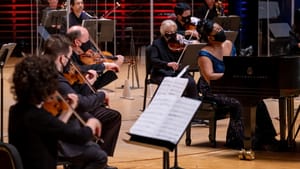Stay in the Loop
BSR publishes on a weekly schedule, with an email newsletter every Wednesday and Thursday morning. There’s no paywall, and subscribing is always free.
The Price is right
The Philadelphia Orchestra presents Rossini, Schubert, and Price

If you don’t know the name Florence Price, you will soon. Price (1887-1953) broke barriers in the 1930s as the first Black woman to have her work programmed by a major American orchestra, but the composer fell into obscurity in the years following her death. The Philadelphia Orchestra is one of several organizations working to restore her legacy.
Distinctly American
The orchestra gave its first performance of Price’s Symphony No. 1 in E minor in November 2020, which Linda Holt reviewed for BSR. This week they took up Price’s Piano Concerto in D minor, more commonly known as the Piano Concerto in One Movement. Both works suggest a musical mind that blends the grandeur of European classical music with a distinctly American idiom. Her rediscovery also reflects the steps Philadelphia and other orchestra are taking to increase equity and diversity in programming.
The original orchestrations for the Concerto in One Movement were thought lost until recently; a recording issued in 2011 by the New Black Music Repertory Ensemble used a score constructed from a two-piano reduction. To my knowledge, the current performance reflects the original score’s first performance by an American orchestra in nearly 90 years. (The Chicago Women’s Symphony gave the world premiere in 1934.)
Play it again
Price packed a wealth of ideas into this immensely listenable piece, which clocks in at roughly 20 minutes. The opening section contrasts lushly Romantic music for piano and strings with bluesy brass writing. It progresses into a second section awash in the spiritual tradition, underlaid by writing for the oboe (played here by associate principal Peter Smith) that recalls Verdi’s mournful use of that instrument in Aida. The final section opens with an ecstatic Juba-like dance, before dipping into ragtime and back to Brahmsian classicism. It’s the kind of music you hunger to hear again as soon as it’s finished.
That’s especially true when it’s played as ebulliently as it is here, with a soloist as distinctive as Michelle Cann. A graduate of the Curtis Institute who currently holds that school’s Eleanor Sokoloff Chair in Piano Studies, Cann brings flawless technique and measurable passion to her assignment. She’s especially adept at bringing a feeling of freewheeling release to the Juba dance without sacrificing any sense of control; when the piece pivots toward its majestic conclusion, the effect is jarring in the best possible way. The piano is the shining center of this work, but Yannick Nézet-Séguin keeps the orchestral forces perfectly balanced.
In presenting this performance, the Orchestra partnered with ONEcomposer, a Cornell University initiative dedicated to preserving the legacies of “historically erased” musicians. Price is their current focus, but she is far from the only composer of significance who’s been excluded too long from the canon. Let’s hope that partnerships, and discoveries, like this continue well into the future.
Rossini and Schubert
Elsewhere, the program found the Philadelphians on more familiar footing. Rossini’s one-act opera La scala di seta is rarely performed anywhere today outside of that composer’s annual festival in Pesaro, Italy, yet its overture has become an orchestra staple. Nézet-Séguin led a crisp, plucky performance. Although the piece is famous for its fiendish oboe writing—played here with great wit by principal Philippe Tondre—I appreciated the balance Nézet-Séguin struck between that instrument and the equally important clarinet (Ricardo Morales), horn (Jennifer Montone), flute (Patrick Williams), and bassoon (Daniel Matsukawa).
The concluding performance of Schubert’s Symphony No. 4 in C minor (“Tragic”) was stylish, if hardly revelatory. But that’s okay. We know the Philadelphians can play Schubert. The revelations came elsewhere.
Image description: Members of the Philadelphia Orchestra play onstage in Verizon Hall with pianist Michelle Cann, a Black woman wearing a blue sequined dress. She plays with a passionate expression above her black facemask. The musicians around her are also masked.
What, When, Where
The Philadelphia Orchestra. Rossini, Overture to La scala di seta; Price, Piano Concerto in One Movement; Schubert, Symphony No. 4 in C minor (“Tragic”). Yannick Nézet-Séguin, conductor. Michelle Cann, soloist. Streaming on demand through February 25, 2021 ($17 rental fee) at philorch.org.
Sign up for our newsletter
All of the week's new articles, all in one place. Sign up for the free weekly BSR newsletters, and don't miss a conversation.

 Cameron Kelsall
Cameron Kelsall